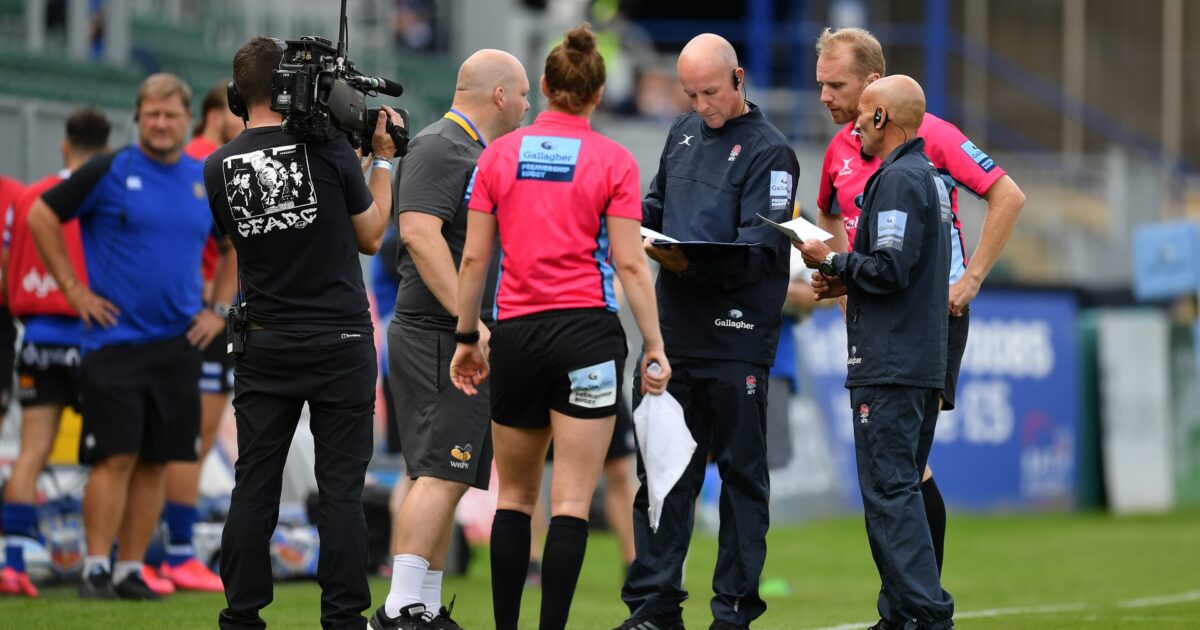Video: The conversation that highlighted how Wayne Barnes remains one of the best refs around

Veteran referee Wayne Barnes was marked absent for the opening two restart rounds of the Gallagher Premiership after getting caught out by revised UK Government quarantine regulations while on holiday in Spain, but his commanding presence was to the fore in the Bank Holiday Monday 27-23 win by Wasps at Bath.
Having made his comeback in last Tuesday’s enjoyable top-of-the-table clash between Bristol and Exeter, a result that tipped the way of the Chiefs in the closing minutes, Barnes typified his experience with his handling of the ramifications of Wasps losing their replacement hooker Gabriel Oghre to first-half concussion just eight minutes after he had replaced injured starter Tommy Taylor.
What transpired was the game went to uncontested scrums after Wasps prop Tom West opted not to switch to hooker with loosehead Simon McIntyre coming on as Oghre’s front row replacement.
The initial indication from the Wasps sideline was that scrums would remain contested, though, with West switching into the middle of the front row and competing.
However, rather than take the word of the sideline as gospel, Barnes went back onto the pitch and quizzed West, the Wasps loosehead, about whether he really was confident enough to fill in.
? A fascinating listen…
Here is exactly what happened when Wayne Barnes asked Tom West if he was happy to safely scrum at hooker for Wasps ?
Players' safety always comes first ?#GPTonight pic.twitter.com/R8S8fhNA5Q
— Rugby on TNT Sports (@rugbyontnt) August 31, 2020
The answer eventually was that he wasn’t and the match restarted with uncontested scrums. Here’s how the conversation at The Rec unfolded:
Wayne Barnes: This will be your second hooker off?
Dave Bassett, Wasps manager: Yes.
WB: Do you have a replacement hooker or not?
DB: Yes. Tom West is happy and has scrummaged at hooker. More than happy to do that.
WB: So you’re happy to go contested scrum?
DB: Contested scrums.
Barnes then returned to the middle of the pitch to speak with West.
Wayne Barnes has been rightly lauded for his handling of this relatively rare scenario. https://t.co/dnhZSX6Cyu
— RugbyPass (@RugbyPass) August 31, 2020
WB: If you can hook, you can hook and it will be contested scrums. They are telling me you’re a confident hooker. If you’re not confident I’ll order uncontested scrums… make a decision.
Off mic, West gave his answer, saying no to switching to hooker and having contested scrums. This left Barnes to return to the sideline to resume his conversation with Bassett.
WB: Okay, I’ve just checked with your player out of safety. He’s told me he is not confident to hook so it is uncontested scrums but you have to bring a player on in the front row. Player safety is paramount and he’s told me he is not confident to scrummage.
Barnes then returned to the pitch and explained to the packs what will happen.
WB: It is uncontested scrums gentlemen, but they [Wasps] will go to three in the front row who has played front row.
Usually, if a team has injuries and can’t contest scrums, they must forfeit a player and play out the match with 14. However, the regulation is different when a player has been concussed, which allowed Wasps to continue to have 15 players despite uncontested scrums.
Top 4??!! pic.twitter.com/EuyfgSkBnn
— Wasps Rugby (@WaspsRugby) September 1, 2020
Wasps coach Lee Blackett said afterwards: “At first, he [West] said he was (prepared to play hooker) and I think the realisation then set in.”
BT Sport pundit Ben Key, the 2003 England World Cup winner who was working at the game, later added: “When Wayne first went up to him [West], he said yeah I’ll give it a go. No, you won’t give it a go. Can you do it or not?
“But the brilliant thing about that is out of shot you can see him talking to someone. I bet it was the second rows going we don’t want scrums. We want to rest so we can run around. Just make sure you say no.
“I have played in a game with uncontested scrums. As a front-five forward you have got so much more energy than you usually have.
“He hasn’t played there for three years and it’s probably is the right thing to do but it would have been interesting if Wayne Barnes had gone and said, as is sometimes the case with non-head injuries, you’ll have to lose a player – whether he would have felt pressurised into playing there so they could keep the full complement.”
Sunday morning nudge for Saturday's pre-game feature, a colourful trip through the rugby years with Wayne Barnes – @EnglandRugby@SixNationsRugby @lydney_rfc @premrugby#ITAvSCO ?????????#WALvFRA ?????????#ENGvIRE ?????????https://t.co/x1koNGOeJd
— liam heagney (@heagneyl) February 23, 2020

































